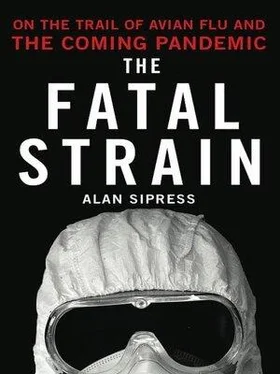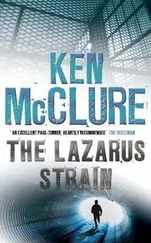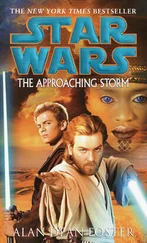Supari had been stunned weeks earlier to learn that an Australian drug maker, CSL Limited, had used an Indonesian virus strain provided by WHO to manufacture an experimental human bird flu vaccine. “I never gave permission to any Australian company to produce a vaccine based on the Indonesia strain of the virus,” she protested.
Even before that, she had opened talks with U.S. drug maker Baxter International over acquiring 2 million doses of bird flu vaccine for Indonesians. Baxter had offered to sell the vaccine, which was based on a separate H5N1 strain from Vietnam, but at the steep market price. That was when Supari gained her first glimpse of what she called the “neocolonialism” of WHO. “The situation is ironic,” Supari later told me. “The virus obtained by vaccine manufacturers came from dead Vietnamese people who had been grieved by their brothers and sisters and parents, and then it is commercialized by other nations without compensating Vietnam.” Supari had made Baxter a counter-offer. Indonesia would give permission to Baxter to develop a vaccine from the Indonesian subtype in return for 2 million vaccine doses and help in establishing a vaccine plant in Indonesia itself. Indonesia and Baxter signed a memorandum of agreement just days before Heymann and Fukuda returned to see the minister. The suggestion from Jakarta was that no one else would get access to the Indonesian strain, now the deadliest on Earth, unless they met Supari’s demands.
For half a century, countries had freely provided samples of circulating flu viruses to WHO’s collaborating labs under a system called the Global Influenza Surveillance Network. These routine viruses were analyzed by WHO each year to predict which would cause the next round of seasonal flu. Then the seed viruses were turned over to drug companies to make annual flu vaccines. The developed world has been home to both the labs and the drug makers. But since most of those getting flu shots were in Temperate Zone industrialized countries anyhow, poorer nations had paid the process little mind. Now, facing a possible pandemic, Supari was challenging not only this traditional system but the integrity of WHO itself. Her attack was unprecedented in the agency’s history. Further, she was making the claim that viruses were biological resources owned by the countries where they circulate, not public health information that must be shared freely with the world. She insisted that WHO acknowledge Indonesia’s sovereignty over its viruses and sign a material transfer agreement, which would limit what could be done with Indonesia’s virus samples and potentially entitle it to compensation if they were used commercially.
But senior WHO officials feared that such conditions could wreck the global surveillance system. Flu specialists depended on unencumbered access to virus specimens to watch for menacing twists in viral mutation, keep the tests for the virus updated, and ensure that vaccine research remained current.
“WHO has become a target for Indonesia,” Fukuda later lamented. “That’s not us. We support Indonesia.”
There were already signs the Indonesian rebellion might spread. Thailand, for one, had recently signaled its sympathy in remarks at a WHO executive board meeting. Heymann and Fukuda aimed to keep the disagreement from escalating any further. They wanted to frame the debate around proposals for reform, like making the virus-sharing system more transparent and enhancing the access of poorer countries to vaccines and vaccine production technology. Heymann balked at Indonesia’s more radical demands. The meeting was deadlocked, and yet they kept talking and arguing for five hours, right until the last minute when the visitors had to leave for the airport.
As Supari escorted them from her office, they were unexpectedly confronted by a pack of reporters. She hadn’t bothered to tell her guests she’d invited the media. It felt like an ambush, and two things immediately became clear: They would miss their flight. And there was now little hope of keeping the dispute from boiling over into a heavily publicized political row that could sabotage global cooperation between rich and poor.
Heymann struck a diplomatic note for reporters, telling them, “Indonesia’s leadership alerted the international community to the needs of developing countries to benefit from sharing virus samples, including access to quality pandemic vaccines at affordable prices.” He said he hoped Indonesia would soon resume sending its specimens to WHO.
Supari turned and glared at him. “Without the new regulations,” she said, “until our last drop of blood, the answer is still no, no, no!”
It was time for Margaret Chan as director general to weigh in. She could speak with unquestioned authority for WHO and, by virtue of her position, demonstrate to Supari that she was being accorded all due respect. Chan, moreover, could connect with Supari as an Asian woman. But if Supari wanted to rumble, Chan was an adroit inside fighter well seasoned by Hong Kong’s contentious politics.
At the end of February 2007, the women spoke by telephone. The conversation seemed to end in agreement, with Supari pledging to begin sharing samples. But within hours, they were disputing what they’d agreed to. Supari told the press that Chan had acceded to demands that specimens be used only to monitor the evolution of the virus and not for making commercial vaccines. WHO officials adamantly denied the account. No samples were sent.
A month later, Chan made an unscheduled detour from Singapore to pursue the issue with President Yudhoyono himself at the Istana Negara palace in Jakarta. The Indonesian leader stressed that international drug companies had to make affordable, high-quality vaccines available to developing countries. Chan agreed, vowing to do what she could. Afterward, Supari, who had attended the talks, came out and announced the disagreement was essentially resolved. “We will resume the sending of virus samples for the sake of global interests,” she told reporters. “The delivery will take place this year, within two months from now at the latest.” Again, it didn’t happen.
And so it continued over the months, with each side accusing the other of bad faith. One grueling negotiating session followed the next, often grinding far into the night and deep into the fine print of international law. In public Chan would at times express sympathy for Indonesia. “I believe the developing countries are right to ask us to address the issue of equitable access now,” she told a meeting of drug industry executives and laboratory directors. “To date, developing countries have suffered the most from this virus.” But in private, she was increasingly exasperated. Sometimes she let it show. “If you do not share the virus with us, I want to be absolutely honest with you, I will fail you,” Chan warned ominously during a speech at the annual meeting of WHO member states in May 2007. She didn’t name Indonesia, but she didn’t have to. “I will fail you because you are tying my hands. You are muffling my ears. You are blinding my eyes.”
The prospect of a flu pandemic had deepened the fissure between rich and poor, which in turn was subverting international efforts to head off the coming plague. Poverty had always hamstrung the fight against disease, leaving humanity vulnerable to epidemics that arise in the developing world. The emergence of AIDS from Africa was but one tragic example. But now the world was also at risk because Indonesia had realized that viruses were a resource potentially more prized than oil and could be used to press its claims against the wealthy. The challenge represented such a threat to global health that some veteran observers suggested the UN Security Council might ultimately be asked to break the impasse.
Читать дальше











